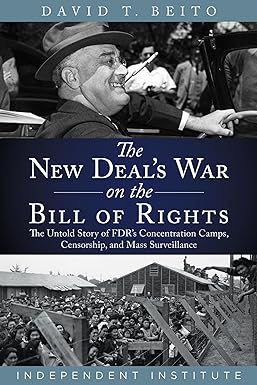
The author, David T. Beito, is a history professor emeritus at the University of Alabama.
A random thought I had while reading this book: You know how New Hampshire's motto, "Live Free or Die" was borrowed from its French Revolution counterpart, "Vivre Libre ou Mourir"? Maybe the USA's motto should be similarly derived from "Plus ça change, plus c'est la même chose". Or "the more things change, the more they stay the same."
That would be tough to fit on a penny, though. We'll probably stick with "In God We Trust".
This book is good antidote to more hagiographic depictions of Franklin Delano Roosevelt. It's not really a "warts and all" history; it's just warts, concentrating on FDR-era abuses of civil liberties. But (see the subtitle) it's an "untold story" in the sense that none of this is secret, FDR's participation and acquiescence in the abuses is just neglected. And—plus ça change—I was struck by how many of those abuses have their counterparts in more modern controversies.
The biggie, of course, is the WWII roundup of west-coast Japanese and their relocation to inland concentration camps. Beito notes the cognitively-dissonant treatment by FDR-sympathetic historians: "Over and over again, they leave the impression of two very distinct Roosevelts. The first was the Roosevelt of the New Deal and World War II foreign policy: decisive, bold, humane, and dedicated to advancing the four freedoms. The second was the Roosevelt of internment: a passive and reactive, and somewhat clueless, prisoner of events." Not a particularly accurate, or even coherent, potrayal, and Beito provides some needed corrections.
Other chapters concentrate on different aspects of how FDR's minions in Congress, regulatory agencies, and local political machines cracked down on opponents of the New Deal, court-packing proposals, and pre-WWII foreign policy. Telegrams were mass-snooped in fishing expeditions. A bill was proposed to felonize newspapers who printed as "fact anything known to the publisher … to be false". (Disinformation! Fake news!) Mailing permits were arbitrarily yanked from publications.
The relatively new technology of broadcast radio had been socialized, unfortunately, by Herbert Hoover, with the permission of Calvin Coolidge; this allowed the Feds to demand that the frequencies be used in the "public interest", i.e., uncritical of the state. (Many broadcasters were, of course, complaisant.) Administration critics were silenced. (To be fair, one of them was the disgusting lunatic Father Coughlin. Although he didn't get into serious trouble until he turned against FDR.)
Democrat-controlled congressional committees dragged in political dissidents for intrusive and unfair "investigations". (It's clear that Joe McCarthy learned his tricks by observing such Democrats.)
For a lot of these attacks, the ACLU, whose upper ranks were filled with New Dealers, was conspicuous in its reticence; many left-leaning opinion magazines remained quiet, or gave encouragement.
Reader, Beito does not even touch FDR's neglect of European Jewry and his associated anti-Semitism. To be fair, that's a little outside the scope of the book. But, once again, plus ça change…
![[The Blogger and His Dog]](/ps/images/me_with_barney.jpg)



